Salon contracts and salon non compete agreements can be a bit confusing and hard to understand. In this blog post, we will detail the most common salon employment contracts, and explain how these agreements may or may not benefit a hair salon owner and salon employees.
Hi there, my name is Susan Wos, I own Salonspa Connection- a non brand affiliated space to connect to the information and opportunity you need in the salon industry. I see a lot of chatter online about non competes, contracts and general questions around this topic.
Whether you are an owner or a professional, get the information you need on employment contracts, here. Take advantage of a free download, explore salon employment laws and decide for yourself what actions to take concerning contractual agreements.
Salon contracts are used to protect a salon owner from employment (or booth rental) related issues. Common contracts and agreements address: quitting the salon, taking salon clients, pay or rent, criteria for raises or leveling up in the salon company, social media guidelines, trade secrets and culture contracts.
A healthy working relationship between both salon management, and salon employees is essential to the growth of each party. Setting clear expectations, outlining termination details, and detailing the rules for new employees helps to eliminate future issues.
Looking for a fair and concise contract for employees? Download our free template and tweak it to reflect your salon’s requirements.

The Federal Trade Commission has ruled that non-competes are banned for all employees with the exception of senior executives. be warned this does not include NDAs, employment agreements or contracts employers may require as a condition to work in a beauty business.

Well thought out, legally binding and fair salon contracts pave the way for success. If you own booth rental salons, an independent contractor agreement looks quite different from a salon employee contract.
Understand that while salon contracts can be a wonderful thing, they can also prevent owners from hiring. Think through what is most important in employment contracts, and only include deal breakers or document what salon employees are responsible for.
While contracts like non competes can deter stylists from soliciting salon clients when they leave, no one owns people or clientele. Client data belongs to the business and should not be tampered with.
There is nothing to prevent hair stylists from posting on social media or privately contacting clients. Enforcing a non compete may be more trouble than it’s worth and often the salon will not retain the clients it loses to stylists quitting a salon.
Watch our Tiktok series on non-compete agreements HERE.
Owners can benefit from non-compete agreements in several ways. One of the significant benefits is that these agreements may preserve both employees and clients.
Non-compete agreements can prevent employees from taking their customers with them when they leave the salon. Taking salon clients can have a severe impact on the salon’s revenue.
By preserving customers, owners can ensure business continuity and prevent significant financial losses. Before implementing a non compete clause, consult a lawyer to ensure it is fair to both you and salon employees.
Protect your salon business and client base in your insurance policy. Contact GILD salon insurance today to get covered!
Another benefit of non-compete agreements is that they can protect the salon’s trade secrets. Many salon owners invest a lot of time and money in creating unique and proprietary services.
Examples would be: haircuts, styles, and techniques that distinguish them from their competitors. By requiring employees to sign non-compete agreements, owners can protect these secrets from being shared with a competing business owner.
Are you hiring? Get exposure for your hair salon and post your open positions on this page.
Despite their benefits, non-compete agreements have drawbacks. One of the most significant downsides is that they can keep unhappy salon employees in a situation that does not promote good salon health.
Restrictive agreements are often used as fear-based contracts to prevent employees from leaving. When a beauty therapist or hairstylist is unhappy with their environment, have limited opportunities for growth, or want to change their job or pay, employee contracts limit this opportunity.
When salon pros want to break a legally binding employment contract and are tied to a salon they are ready to leave, problems can ensue. This can negatively affect the morale of the entire team, leading to decreased productivity and increased turnover.
Owners work very hard to build a small business and want to keep salon management and staff. Binding unhappy parties to your business can create a culture of dishonesty.
Additionally, drawbacks of non-compete agreements is the restriction the career growth of employees. If an employee wants to start their own salon business or work for a competitor, a non-compete agreement can prevent them from pursuing their career goals.
This can lead to resentment and a lack of loyalty towards the salon, which can further affect the morale and productivity of the team.
Looking for a new salon to work in? Check out our jobs & booth rental openings!


Hiring a lawyer can be expensive, however consulting a law expert is key to completing the paperwork for a salon non compete agreement. A typical non-compete agreement includes a clear understanding of what the stylist or nail technician is not allowed to do, should they exit your business.
Download the template above and add how many miles the stylist is prohibited from working from your salon. This is usually 1-10 miles but will be challenged in the right to work states.
Focus on a stylist contacting clients. Customers who are given notice from a salon employee by getting contact details from your salon software tools for client data should be against the law of your agreement.
Bear in mind, you don’t own clients, but you can prohibit a stylist directly contacting customers from the employers database. Being clear before you hire helps both you and the hairstylist have clear cut guidelines.
Salons that are booth rental or a salon suites will have a salon independent contractor agreement. This details rental price and salon rules you have to maintain the integrity of your business.
Policies on mutual respect, stylist responsibilities, hours and a team culture agreement are common for a salon independent contractor agreement.
Learn more about salon booth rental contract agreements here.
Hair stylists are 1099 employees when they are an independent contractor in a booth rental hair salon. A “salon employee” means they are paid by the owner and they do not take money from customers.
For tax purposes, a 1099 stylist is not employed, they are contract. Learn more about salon 1099 employment contracts and laws here.


To write a contract for a contract employee you must start with a list of responsibilities. Once you have completed everything they are responsible for, create a list of time and quality expectations.
Prior to providing an employment contract, come to an agreement on pay and provide the employee with a copy of the contract. This will help you understand if they are ready to move forward or if they should seek a different employer.
If you need assistance, Legal Zoom and Do Not Pay are great resources for contract creation.
To write a contract for a part time employee, edit the full time employment contract to detail the difference in hours and what they will be paid. Document any changes to the employment contracts and seek a lawyer for review.
You can make your own contract of employment if you generally know what clauses to include. Flesh through pay, health insurance, retirement plans, training and proper notice for time off.
Tools like an Do Not Pay, an AI legal service is helpful to create your own contract if you are on a tight budget.
Commission in a salon describes the type of pay the employer utilizes to compensate a stylist. This can mean they get an hourly rate until a service amount is achieved or the hair salon employee contract can be commission only.
An example of a salon commission is when a hair salon employee gets a percentage of their services provided in a paycheck. For instance: Sally brought $500 in hair service for a week, she gets $250, and the business gets $250 for a 50/50 commission split.


60 40 commission is the percentage of what a business gets and a hairstylist makes. For example: Sally had $500 in haircut sales, the business gets $300, Sally makes $200.
A new client consent form is an agreement you sign ensuring the salon provides expert training and has your health as a priority. This generally serves as a document to clarify pricing, process and any potential issues that may have been uncovered prior to the service being provided.
While Beauty Industry Employment Contracts have advantages, there are drawbacks too. Preserving staff, client lists and protecting secrets is something all owners want for their business.
Freedom restricting agreements can keep unhappy employees in the salon business. This can negatively affect the team’s morale, and restrict the career growth of employees.
Owners should use non-compete agreements carefully, considering both the benefits and drawbacks, and not as a fear-based contract to prevent employees from leaving.
Prioritizing creating a positive and supportive work environment eliminates the need for worry in your business. This motivates employees to stay, rather than using non-compete agreements as a tool to retain them.
Get a great prequalification process down with Enlightened Hire